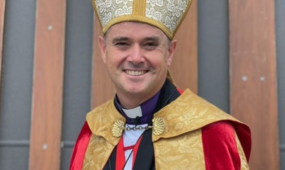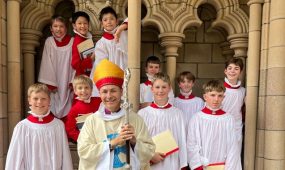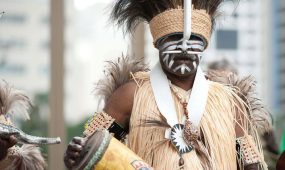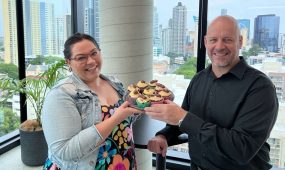Q&A with third-generation priest, dad, former physio, keen tree climber and new ASC Director of Mission, Fr Richard Browning
Spotlight Q&A
Meet Fr Richard Browning and find out about his new role as Director of Mission at the Anglican Schools Commission, his Hunter River childhood, the funniest thing that happened to him recently, and how Jesus took a hold of him one weekend, changing his life forever
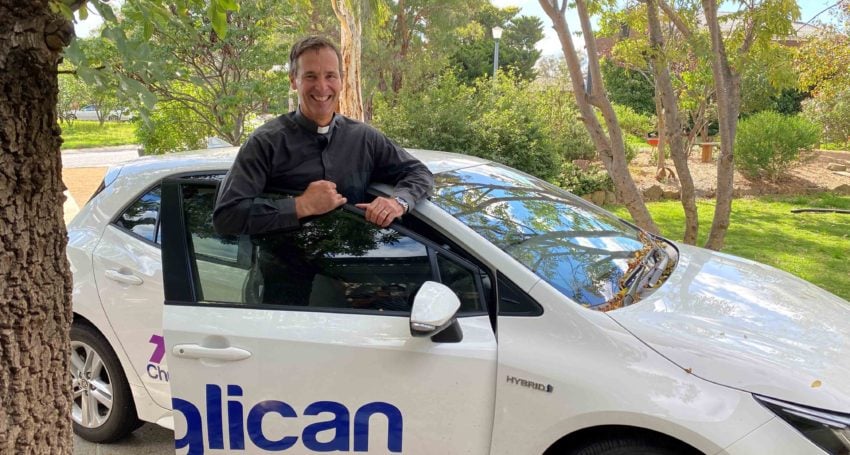
After attending boarding school at The Armidale School, Fr Richard Browning came to Brisbane to study physiotherapy at the University of Queensland where he met his wife Melinda “over a cadaver in the anatomy labs”. He spent considerable time working in Anglican Youth ministry before living onsite at St Francis College where he did his theological training. Richard and Melinda have three delightful and inspiring adult sons, Sam, Zach and Matt. Richard and Melinda are keen wicking bed gardeners and passionate about the God of creation and solidarity with the whole of creation.
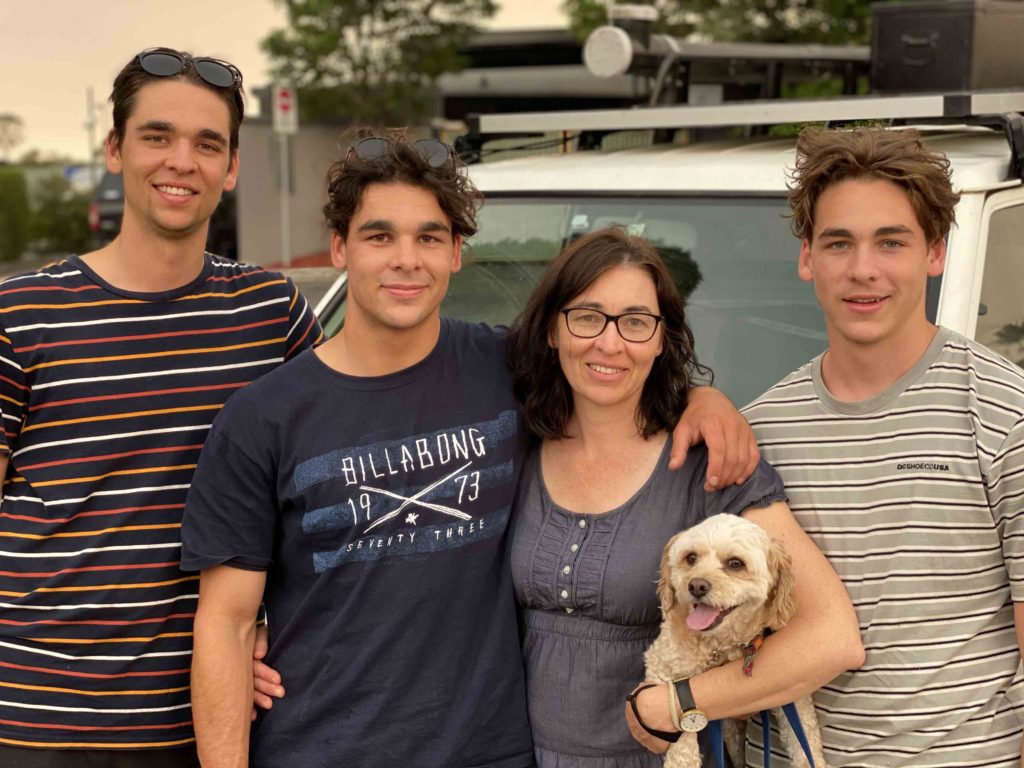
Richard and Melinda have “three delightful and inspiring adult sons, Sam, Zach and Matt”
Where do you currently live and where do you worship?
Taringa. I am visiting a lot of places but am most closely connected to the Community of the Way, who are based at St Francis College.
How long have you been involved in the Anglican Church and in what roles?
I was last in this Diocese as Chaplain at Coomera Anglican College and Associate Priest at Gold Coast North Anglican Church. I have been away 16 years, ministering as Chaplain at Radford College, a school in Canberra’s north.
Advertisement
What is the name of your current role and what does your role involve?
Director of Mission at the Anglican Schools Commission (ASC). This role puts me in a team of amazingly capable peers serving our schools. My role is to listen carefully and shape and build the ethos of the ASC and support principals and chaplains, their communities, and the identity of Anglican schools, with a specific focus around how each lives their vision, being faithful to the mission of the Gospel.
What projects and activities are you currently working on?
The key project I am currently working on is developing the ethos and vision of the ASC. Day-to-day activities include supporting chaplains and their work of leading communities in worship and faith formation; supporting a culture of service and student engagement in the work of neighbourhood and community wellbeing, often called ‘service learning’; creating resources for chaplains and student leaders; and, creating pathways for students to deepen their faith and link with Anglican communities of faith in their post-school lives.
Advertisement
What have been the highlights of your roles so far?
Highlights so far? It has to be anything to do with connecting with chaplains and engaging with students. It is a delight to listen to the questions and interactions from students responding to the story of the day, such as at Cannon Hill Anglican College in February when I told the short story, ‘A Wombat Called Bruce’. It is also a delight to learn from the chaplains as they work with great passion and skill.
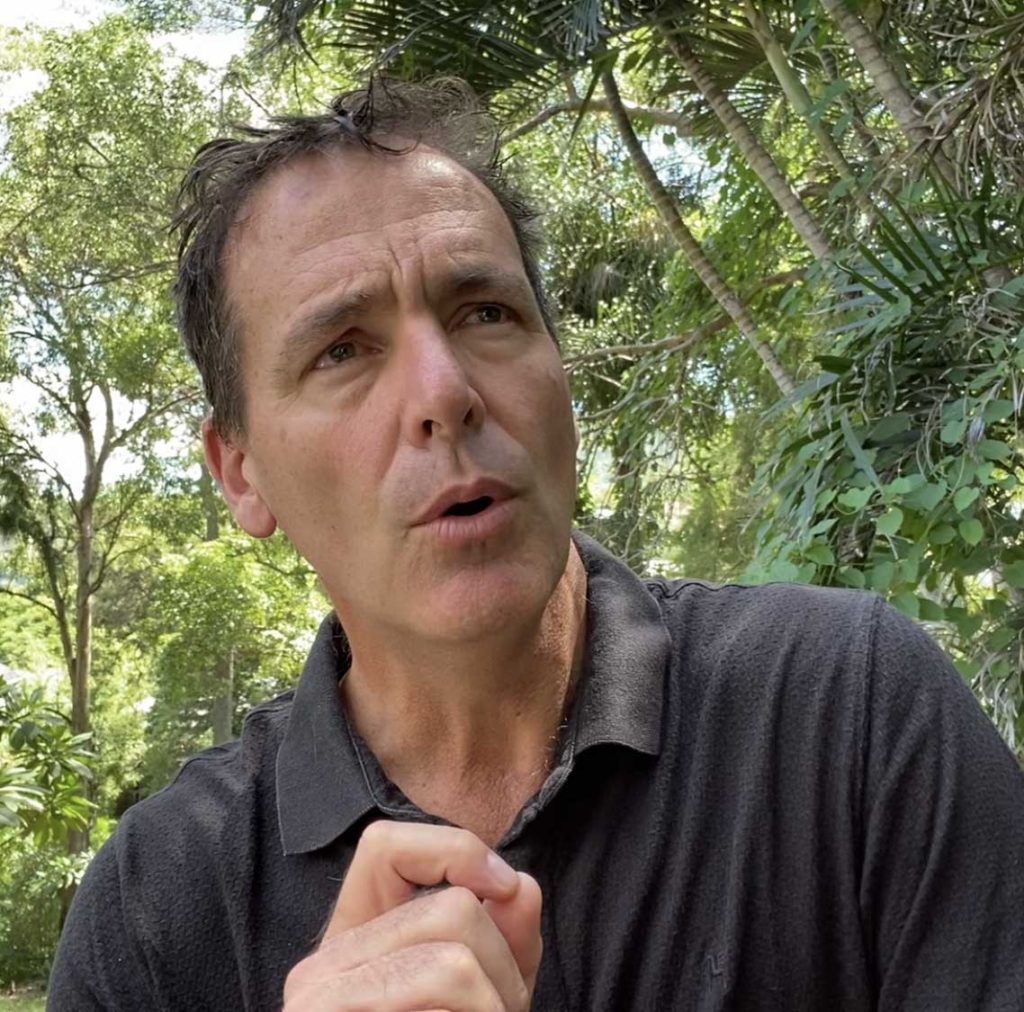
Fr Richard Browning retelling the story ‘A Wombat Called Bruce’, which he shared at Cannon Hill Anglican College in February 2020
What have been the key challenges of your role so far and how have you worked through these?
I am no longer immersed daily in a school community. I am somewhat removed from the coal face as I no longer work onsite at a school alongside the student and staff communities. The best way through this is to develop good relationships with the chaplains and their schools. This takes time.
What are your plans and goals for the next 12 months?
It is as complex and simple as building solid relationships with chaplains, principals and networks within the schools. Everything else will flow from this.
Can you tell us a little about your personal faith journey?
I found Cursillo, a lay international Christian movement, a significant experience in my faith journey in 1988. It wasn’t a mountain top. It was like standing at a confusing table of jigsaw pieces which I already had and then across the three-day retreat having them all fall into place. By the end of the weekend the overall picture of the love of God, and the healing and gracious presence of Jesus, leapt out and took a hold of me.
How does your faith inspire you and shape your outlook, life choices and character?
Pastorally, my faith means that no situation is impossible to be present in, for I need not have any answer, save being present and work on listening. I model this presence on Jesus’ incarnational solidarity with the human experience. And, as the Gospel is about goodness, liberty and sight, the concrete realities of life are where the mission of Christ is lived.
What is your favourite scripture and why?
It changes almost every Sunday, but in terms of what I find myself using the most, probably the first creation story of Genesis 1 generally, and the notion of ‘image and likeness’ specifically. In terms of the most profound window into the grace of Jesus, it would have to be his words from the cross: “Father, forgive them, for they do not know what they are doing.”
What person of faith inspires you the most and why?
My grannie. Her life was full of many challenges, her garden was amazing and through to the very end, she was always happy with enough, not more, and was content, even with very little.
What are the primary strengths of the Church and what is the best way to make the most of these for the benefit of our communities?
There is only one primary strength of the Church, and that is the life of Christ. So, the grace, the love, the light of Christ are the gifts we ‘possess’. These (must) take root in the Church community whose work it is to be a servant to the broader community and be a part of concrete, historical good news, liberty, release and healing.
What are the primary challenges currently encountered by the Church and what is the best way to overcome these for the benefit of our communities?
All the things we have historically been good at have equivalent private or public services, from schools to hospitals to fellowship circles to ‘wellbeing’ programs to cultural festivals, and so on. Until we can be clear about what we are and why, the broader community will access the social, emotional, material and intellectual needs that get close to clothing the soul. Deepening our understanding of who we are as the Body of Christ and that Christ is not constrained to ‘the Church’, the more faithful we will be as the Church and the gift we are meant to be and lead, like leaven in bread, to the rising of the whole.
What is the kindest gesture you have ever received or witnessed?
I have received serial kindness from my parents, of the kind that is so relentlessly consistent, through even to this day, as to be unremarkably normal. It is difficult to name just one, but the result is an overwhelming sense of long-term historically grounded unconditional love.
What is the best piece of advice you have ever received and who gave you this advice?
I am not a big fan of advice. But examples that I seek to copy, include my father, who taught me ‘know your people’. My mother, who taught me that ‘faithfulness and a few good words are much better than windy waffling’. My wife Melinda, who demonstrates hospitality, welcome, generosity and faithfulness. And, Jesus, in what is summed up in the Beatitudes – a simple upside-down logic that I’ll spend the rest of my life growing into.
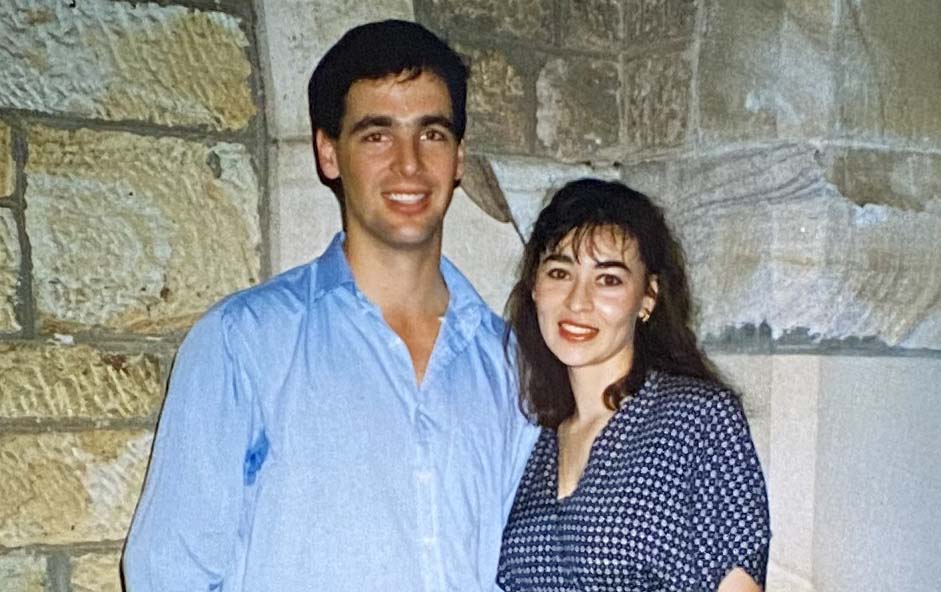
Richard and Melinda at their engagement party, held in in 2001 at Old Bishopsbourne, St Francis College
What do you do in your free time to recharge and relax?
Read. Exercise. Play board games with family. Examine trees. Walk among trees. Climb trees.
Where do you do your best thinking?
While moving – walking, riding, scooting.
What’s your best childhood memory?
There is no one memory, but I had the most wonderful childhood. Invariably it would involve riding dragsters (push bikes), building cubbies, hanging out with my brothers and friends and playing by the banks of the Hunter River on long, long days out, returning home just on or after dark.
Related Story
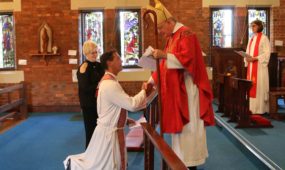 News
News
Farewells and a Commissioning
If you are having a bad day, what do you do to cheer yourself up?
It’s exercise. I don’t run anything over 100m much, but I do like to run as fast as I can. It takes much longer to warm up and get to top speed.
What is the funniest thing that has happened to you recently?
I bought a 1000L IBC (a type of pallet tank) off Gumtree last week. I don’t have a trailer and the plan was to roll it end over end all the way home to Taringa (only 1400m away). But the guy wouldn’t sell it to me. He refused to let me be seen rolling an IBC down his street. I gave it my very best shot. I thought I was very convincing, both in word and with visual role play actions demonstrating my trustworthiness and competency. He just looked at me, unmoved, and said, “no”.
What’s your unanswerable question – the question you are always asking yourself?
What does this day ask of me?
What did you want to be when you grow up?
Never a priest. A Wallaby – outside centre in a Jason Little kind of mode. Then a physio to the Wallabies. And to this day, when I grow up, I want to be a really good storyteller.

